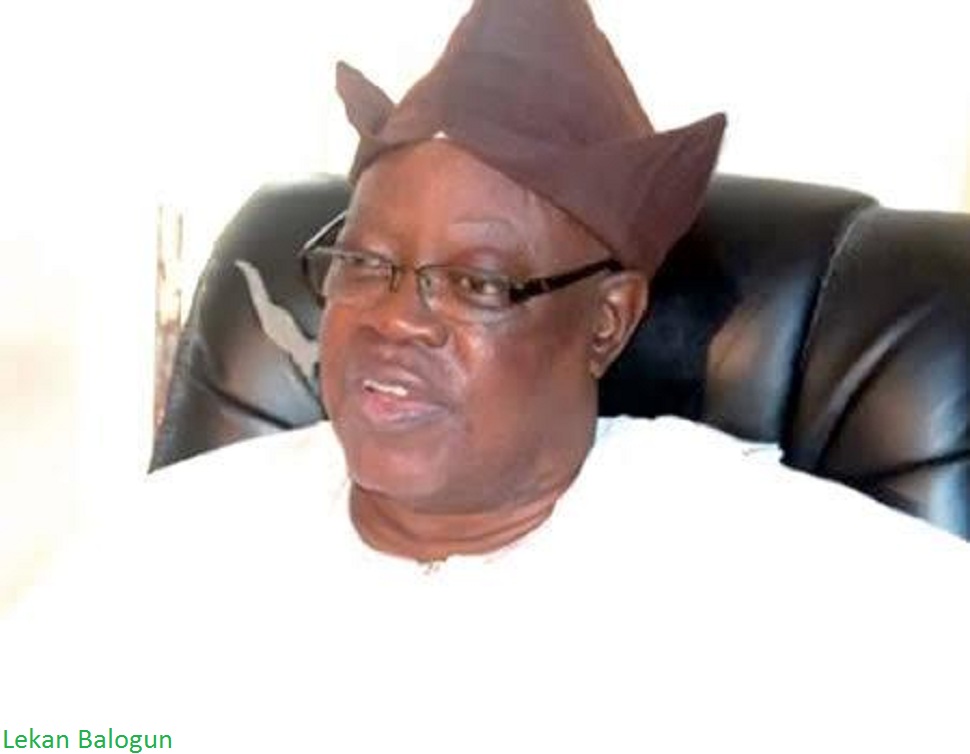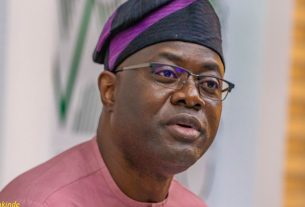There are strong indications that the Otun Olubadan of Ibadanland, Senator Lekan Balogun, who hails from Ali-Iwo Compound in the ancient Yoruba city may be crowned the next King of one of the foremost and largest cities in Africa.
These are strengthened by the historical fact that the traditional structure of ascension to the throne of Olubadan, overtime has been well-arranged such that the chief that will succeed any sitting Olubadan would have known himself, if God blesses such chief with long life and he does not die before the reigning Olubadan.
Indeed, Senator Balogun has become the cynosure of all eyes as the likely successor to Oba Saliu Adetunji, Aje Ogungunniso I, who joined his ancestors at 1am today Sunday, January 2 at the University College Hospital (UCH), Ibadan, Oyo State.
In Ibadanland, there are two ruling lines of ‘Egbe Agba’ (civil) and ‘Balogun’ (military) from where Olubadans are appointed on rotational basis to occupy the stool on the death of a monarch.
The two high chiefs who are next in rank to the Olubadan from the two lines are the Otun Olubadan and Balogun of Ibadanland. The duo are recognised as second-class traditional rulers under the Western Nigeria Law. The chieftaincy system makes the royal succession tradition largely free from rancour, litigation and usurpation. Any male child title-holder of the metropolitan centre of Ibadan is a potential king.
The fact that Oba Adetunji was produced by the Balogun Line has automatically positioned the Otun Line to produce the next Olubadan. And the most senior chief on the Otun Line is Senator Lekan Balogun, who was in the Senate for Oyo Central from 1999 to 2003.
In an interview with Daily Sun in May 2017, Balogun said: “When I became Mogaji of Ali Iwo Compound, there were a lot of much older people, whose kids were even older than me. My compound used to produce the oldest person as Mogaji before my time. Yet, these people insisted I should be made Mogaji in the late 1970s. The Olubadan that we have produced so far – Ali Iwo I, reigned for three months as Olubadan.
“If I make it to the throne of Olubadan, I will be Ali Iwo II. After I became Mogaji, many young and educated men have been made Mogajis, which is the self reforming nature of the Olubadan chieftaincy system.”
But the Laws of Oyo State of Nigeria 2000 Cap 28 spell out the power of the governor in relation to the appointment of recognised chieftaincies in the state. The laws stipulate that the four names would be forwarded to the governor four approval by the Olubadan-in-Council, among whom the governor will approve one. The laws made it known that the names of four most senior chiefs on the line that will produce the occupiers of the Olubadan stool should be forwarded.
In this instance, the four most senior chiefs on the Otun Line are Senator Lekan Balogun as the Otun Olubadan; Senator Rashidi Ladoja, a former governor of Oyo State, as Osi Olubadan; Eddy Oyewole as Ashipa Olubadan; and Abiodun Kola-Daisi, as Ekerin Olubadan.
Section 14 (1) and (2) Chief Laws, talk about qualifications and disqualifications of any person to be appointed into recognised chieftaincy. It states that any person to be appointed into recognised chieftaincy shall be qualified, if he is a unanimously selected by his ruling house, though two or three candidates may be selected by his ruling house, which is the Olubadan-in-Council in this instance, while the kingmakers have the power to appoint one. But the governor must approve the appointment.
Another aspect of the laws say any person to be appointed, must not have been disqualified under any of the following grounds as contained in Section 14 (2) of the Chief Laws, that is, he must not be suffering from any serious physical infirmity; he must not be a lunatic and he must not be an ex-convict.
Every chief on the Otun Line has to ascend 22 steps and every chief on the Balogun Line has to climb 23 steps, to occupy the stool of Olubadan. It usually takes decades to groom an Olubadan for the stool through the stages of chieftaincy promotion, which is an average of 35 to 40 years.
It took Oba Adetunji 40 years to occupy the stool, having been installed as Mogaji in 1976, and became Jagun in 1978. He was installed as the 41st Olubadan on March 4, 2016.
Jagun is the first step on the Olubadan line. The predecessor to Oba Adetunji, the late Oba Samuel Odulana Odugade I, waited for 35 years to become Olubadan. Odulana was promoted to Jagun in 1976 and was crowned as monarch on August 17, 2007 at the age of 93. His reign lasted for nine years.
The predecessor of the Oba Odulana, Oba Yinusa Ogundipe Arapasowu I, who was born in 1912, was crowed the 39th Olubadan at the age of 79 years on May 7, 1999. He had waited for 39 years to occupy the stool, and he reigned for eight years before he joined his ancestors in 2007 at the age of 87. He was appointed Mogaji of his compound at Oranyan in 1960 and was promoted to Jagun Balogun in 1964.
Also, the predecessor to Oba Ogundipe, Oba Emmanuel Adeyemo Operinde I, spent a total of 41 years between the time he was appointed the Mogaji of his family at Isale Ijebu in 1953 and January 14, 1994, when he was crowned as the 38th Olubadan. He reigned for five years. The 37th Olubadan, Oba Yesufu Oloyede Asanike I, was also in his 80s when he became king in 1983 and his reign lasted for 10 years.
Lekan Balogun’s (Otun Olubadan) Biography
The Otun Olubadan of Ibadan Land, sits on the Board of several companies with interests in Oil and Gas, Distributive Trade, Management Consulting, Mechanized Farming and Export of non-oil items as well as Travels and Tourism.
Erstwhile Administrator/Head, Industrial Relations, Recruitment and Scholarships, Planning and Development at Shell Petroleum Development Company, Balogun was also a Research Fellow with the Ahmadu Bello University, Zaria; a Director with Triumph Newspaper, Kano; Editor of the Monthly Magazine-“The Nigerian Pathfinder” as well as Management Consultant for Multinational Organizations such as Leyland, Exiat Battery and Nigerian Breweries. He’s a renowned technocrat, author and philanthropist.
He holds a Doctorate, Master’s and Bachelor’s Degrees in Public Administration; Public and Social Administration and Economics from Columbus International University, Brunel University and Manchester University all in the United Kingdom.
A former Presidential Aspirant on the platform of SDP, Senator Balogun was also a Gubernatorial Candidate for the PDP in Oyo State in the present political dispensation and a Senator of the Federal Republic of Nigeria in the Fourth Republic. He was chairman Senate Committee on National Planning and was a member to many Senate Committees such as Appropriations, Security and Intelligence, Police Affairs and Defence (Army). Oba (Senator) Balogun has written and published widely. Many of his publications include but not limited to; A Review of Nigeria’s 4 years’ Development Plan, 1970-1974; Nigeria: Social Justice or Doom; Power for Sale: published in Punch Newspaper; Arrogance of Power; Nigeria: The people must decide, among other publications.
Balogun, who represented the state at the red chamber, senate, and celebrated his 79th birthday last October, is statutorily the next person to occupy the Olubadan stool.
He reconciled with the late Oba Adetunji, less than three years ago following his installation by former Oyo State governor, late Abiola Ajimobi, as a king.
Balogun, a renowned technocrat, politician, and author started his primary education at CAC Modern School, Anlugbua, and lived with one of his brothers, late Hamzat Balogun, who was a civil servant but was studying privately for the General Certificate of Education, Ordinary Level ( GCE O’L).
While he was also subscribing to Rapid Result College in the UK to enhance his performance in the examination, Lekan was secretly reading his brother’s correspondence tutorials which became very helpful to him when he wrote his qualifying tests which was like ‘G4’ at the time.
While in the second year of the three-year modern school programme, Lekan sat for the qualifying examination and passed. Therefore, he left school without completing the programme.
Armed with this certificate, he travelled to the United Kingdom where he studied for his O and A levels certificates while doing a part-time job to sustain himself- all under 18 years of age.
He left the university in 1973 with a Masters degree in Administration and Economics and had a brief stint with the Lamberth Local Government Social Services Department where he worked for one and a half years after which his academic inclination took the better of him and he enrolled for his PhD.
In 1973, he assumed duties as a research fellow at ABU Centre for Social and Economic Research and also had the option of working as a lecturer at the University of Ife now Obafemi Awolowo University but he chose ABU instead because of the desire to relate with other people away from his birthplace and to know their cultures and traditions.
It was during his sojourn in the UK that he developed the white-black consciousness which crystallised into activism and the struggle for human rights. To give vent to his passion, he joined the leftist Marxist movement.
He plunged into the murky waters of politics in 1978 when he joined the Peoples Redemption Party, PRP, of Late Aminu Kano. His charisma, honesty and gallantry soon saw him climbing the political ladder with ease and grace that eventually accorded him the respect and recognition of the political overlords of Oyo State.
Within a short period of time, he had made his mark as an astute politician, activist and champion of downtrodden masses. He later became the gubernatorial candidate of one of the major political parties in the country, the Nigerian People’s Party (NPP) of Dr Nnamdi Azikiwe.
The military coup of December 1983 kept him and other political giants in the cooler for 16 years. He later re-emerged on the political scene with his election as a senator of the Federal Republic of Nigeria in 1999.




